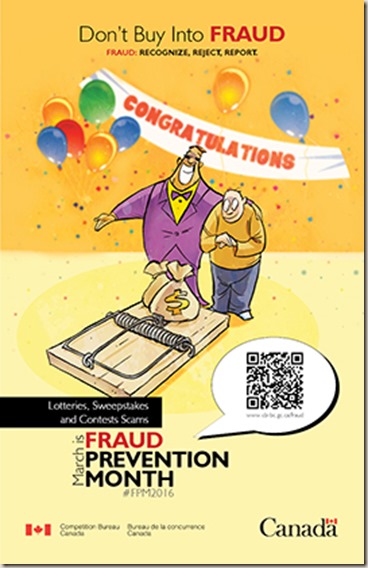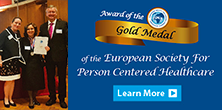March is Fraud Prevention Month!
Pictures are taken from the Competition Bureau of Canada’s website
We all have banks, we all pay tax, we all buy things, many of us go on holiday somewhere occasionally, and most of us now have some form of electronic device linking us to the internet. We all have wants, needs and emotions that can be manipulated.
We get e mails saying “the CRA has a tax rebate/or pay up”, “there are problems with your account” so please click on the link etc. Some may get phone calls saying “your computer is compromised”, “you have won a holiday” and you may even still get a door to door visit from someone trying to sell you something.
It is hard to keep track of all the scams and frauds out there. Most can spot a scam a mile off, but every now and then you do wonder. Bona fide businesses and organisations do e mail you/call you send you letters for a number of reasons and most of our communication now is conducted electronically.
So how do you know who to trust? The simple rule is trust no one.
Unless you have requested the information and initiated the communication, never click on a link sent by anyone or any organisation (whether you use them or not), never respond in any form (e mail, letter, internet, telephone) and never pass on any personal information. No matter what the promise, no matter what the threat, no matter how much sense it makes, DO NOT RESPOND!
If you suspect it is really from an organisation you deal with and that the communication is real then call them directly with your own access number or access your accounts through your usual way.
But the more vulnerable you are the less able you are to make these decisions. This means you have to trust someone to make decisions for you and when this happens you become even more exposed to scams and frauds and poor advice.
Vulnerability does not always mean that you are old and have cognitive challenges. You can be vulnerable if you do not have the necessary knowledge and expertise to make a decision on a purchase or an issue. The less you know about something the more you have to rely on others.
For financial, legal and medical decisions seek someone who has a fiduciary responsibility to look after you (i.e. do not use salespeople to make decisions for you), look for qualifications and professional associations that adhere to fiduciary standards. If you are looking for help with an aging parent you probably need help from a geriatric care management professional before you start selecting a homecare provider, and, if at all possible, avoid anybody offering advice for free or in return for commission.
For large purchases buy direct from reputable and well known organisations and do some research into the products using a number of different sources. If you want to buy on the second hand market then you will need to spend time researching what you need to know about the decision making process as well as the product. We are all vulnerable if we do not take care and for those who are vulnerable we need to take special care! Do not trust anyone unless you know you can trust them and this trust is clearly specified in either government regulation or professional body rules and code of ethics. In all other relationships keep your distance and do your research.
The Canadian Competition Bureau has a website (http://www.competitionbureau.gc.ca) on fraud and page dedicated to fraud awareness month. More information can be found its THE LITTLE BLACK BOOK OF SCAMS. And of course, you can find lots of information on scams and frauds on line.


